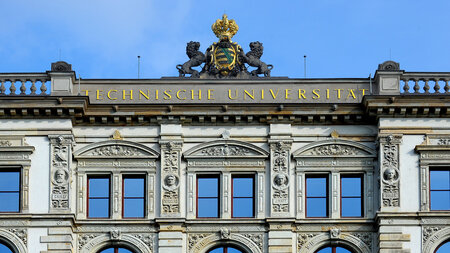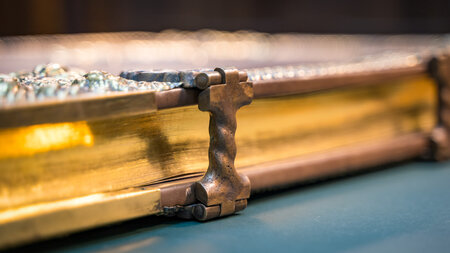Research Project:
The Noisy War and The Noises of War. The Belliphonic in the Middle Ages
Project duration 2021 - 2024
Project description:
Medieval culture and life were significantly shaped by war and violence. Wars have always been acoustic events, as they remain today. For example, in the famous 'Annolied', an 11th-century poem in Early Middle High German, a closely packed series of different phonetic impressions evokes an entire battle:
Oh, how the weapons rang when the stallions leapt at each other! Battle horns blared, blood flowed in streams, the earth beneath thundered, Hell flared up to meet them as the noblest warriors in the world came at each other with their swords. (Annolied, section 27, lines 1-28, ed. E. Nellmann, 2010; transl. R. G. Dunphy 2003)
To understand how wars were planned, conducted, perceived and depicted, one must 'listen' to them: The noise of weapons, shouting, speeches, music, and signal sounds created and structured social spaces as means of communication and distinction, which can today be used for heuristic purposes. While in recent years historical research has been increasingly concerned with medieval soundscapes, war has remained a neglected topic despite rich evidence in the sources. The project aims at closing this research gap and intends to develop a comprehensive understanding of the medieval belliphonic: What kind of roles did sounds fulfill in warfare and war narration? How were they perceived and interpreted? The project also breaks new ground in terms of methodology and combines approaches from sound studies, music history (military music) and (medieval) philology (narratology, phonetic performativity). As part of research project, a phenomenology and semantics of the medieval belliphonic is developed and is thus making a fundamental contribution to the understanding of medieval war and the sound history of the Middle Ages.
The first subproject (“The Noisy War”) aims at the narration of the belliphonic. It investigates the functions of sounds within the narratives of historiographic and literary war accounts of the High Middle Ages. First, the specific intratextual location of the belliphonic in contrast to other soundscapes in the respective works is being determined. In the next step, a comparison across texts and genres is made. The goal is to establish a morphology of the acoustics of war that can assign specific roles to individual acoustic narratives.
The second subproject (“The Noises of War”) focuses on the significance of sounds in late medieval warfare: What were certain sounds used for, how were they received, and what effects did they have? Christine de Pizan, e.g., describes acoustics as an effective instrument of psychological warfare in her "Book of Arms and Chivalry" (c. 1410), which deals with military strategy, law, and ethics in warfare. Following her advice, one should keep the enemy busy with all sorts of assault so that the sounds, the activity, and the noise will keep their bodies as well as their ears occupied, for arrows thicker than flies from crossbows, bombards, cannon shots, the terrible din of stones being thrown by engines against the walls, the shouts of the attackers, the sound of trumpets, and the fear of those who may be scaling the walls will keep them sufficiently occupied. (Le livre des fais d'armes et de chevallerie, II, 19, ed. Ch. M. Laennec 1988; transl. Ch. C. Willard 1999) First, normative statements on the production and use of sounds in contemporary writings on war theory are examined. Based on this, the soundscapes of some of the most important military events of the time in question are recorded and analysed in detail on a broad source basis.
Involved people
Hannah Potthoff
Hannah Potthoff studied cultural studies and history (B.A.) at the University of Potsdam from 2013 to 2017. After volunteering for the UNESCO National Commission in Lusaka, Zambia (2017-2018), she studied Global History at Freie Universität Berlin and Humboldt-Universität zu Berlin. In 2021 she graduated with an M.A. thesis on the fashion history of the Late Middle Ages (“Late Medieval Fashion. Sumptuary Laws and Bologna’s bollatura 1401.”) From 2019-2021, she worked as a student assistant at Freie Universität Berlin at the chair for the history of the High and Late Middle Ages. Hannah Potthoff took part in the Erasmus program and stayed in Luxembourg (2014-2015), Genoa (2016) and Milan (2020-2021). Her research interests include the cultural and military history of the Middle Ages as well as the history of fashion and literature.
Raphael Stepken
Raphael Stepken studied history, philosophy, and cultural studies at Humboldt-Universität zu Berlin. He has been awarded the “Droysen Prize” by the department of history twice. His dissertation project evaluates the significance of intertextuality in humanistic constructions of identity („Agonal Intertextuality. Ambivalence, Satire and Subversion in Enea Silvio Piccolominis Commentarius to the Dicta et facta regis Alphonsi of Antonio Beccadelli“). He received an Elsa Neumann PhD scholarship from 2016-2019 and a doctoral fellowship at German Historical Institute Rome for seven months in 2017. From 2019-2021 he was a research assistant at Humboldt-Universität zu Berlin at the chair for European history of the Middle Ages. His research focuses on medieval military history, sound history, Renaissance Humanism in Italy and Germany, and Dante Alighieri.
Martin Clauss
Martin Clauss is the head of our research project on the Belliphonic in the Middle Ages. He has been a Professor for the history of Europa in the Middle Ages and the Early Modern Times at Technische Universität Chemnitz since 2014. Prior to that, he has researched and taught as a lecturer at the Universities of Regensburg and Cologne and held interim professorships at Berlin (Humboldt-Universität), Saarbrücken, and Trier. After completing his studies in history, Latin philology, catholic theology, and German at Bonn, Munich, Cologne, and Durham, he received his PhD from the University of Bonn in 2001 with a dissertation on the office of ‘Untervogtei’ in the High Middle Ages. His habilitation thesis (University of Regensburg 2008) explores the significance and interpretation of military defeats during the Middle Ages. Martin Clauss has published several other books and numerous articles on a broad range of topics, including medieval military history, the constitutional history of the High Middle Ages, the history of historiography, medievalism, the Middle Ages in school textbooks, and medieval soundscapes.
Monja Schünemann
Help us!
Are you doing research on the Belliphony of the Middle Ages? Or do you happen to have come across something that would fit the scope of our project?
You are welcome to share your findings with us - be it entire monographs, essays, source editions, or just individual passages from specific texts and sources.
You can reach us by email at projekt-belliphonie@… We are eager to receive both references and/or documents.
We are looking forward to your submissions!
Your Team „The Belliponic in the Middle Ages“

__________________________________________
Webmaster: Katja Seyffert-Weiß |
|---|
|
Contact: katja.seyffert-weiss@… |





